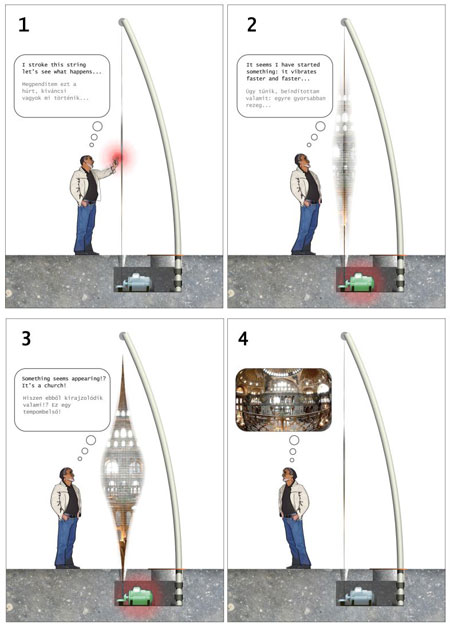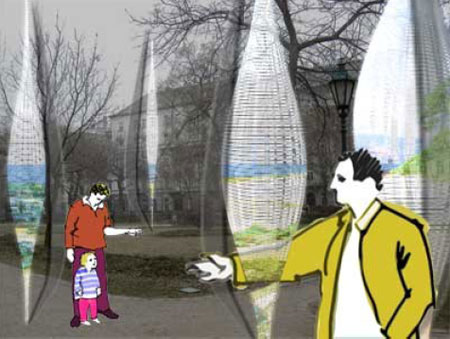Heart of Budapest

Introduction
In his “Invisible cities“, Italo Calvino mentions the town Marozia, where spatial splits have been opened in some unexpected moments(1). Through these holes there is another city’s actual sight can be seen. Similarly, through our Global Splits one can look through to another word, thus the examiner can experience the static presence of another space far from him/herself. Global Splits is able to reveal the surface of the loci, so that another country’s visual interface can flow and penetrate into the viewer‘s urban landscape. However, it is not enough to be a voyeur in the created situation: instead, one has to take part actively in spreading the new landscape. Tactile interaction is needed in order to open the bridges between the visages of remote lands.

Description
We propose various sized bow-shaped objects sticked in the Gödör of Deák tér (Deák Square). According to Persistence of Vision (POV), these objects can create a homogeneous surface while they are rotated2. As a result, a spindle-shape screen is born, where images of the remote horizons may appear. When the strings are not in rotation, they are gracefully pierced onto the ground.
Their distribution is irregular; one can easily walk among them. As a matter of fact, these strings are wires with red, green and blue LEDs on them. When someone pluck a string in front of him or her, the engine of the machine begins to spin the LED wire as the result of the sound of the participator’s movement. Beyond a certain frequency, the string full of LEDs creates a homogenous surface in the air. As it was stated, on the surface one can glance urban images taken from certain countries.
The dialogue between the cut out spaces and the Global Splits objects create a kind of rhizomatic unity, which relations can be constantly modified by the people, in case they include other objects into the game. (According to our previous aim, these objects are able to reach those people as well who were previously lack of any computer skills and techno-literacy.)

Notes
1. Calvino, I. ((1974)2002) Invisible cities. London:Vintage.
2. “This theory is said to account for the illusion of motion which results when a series of film images are displayed in quick succession, rather than the perception of the individual frames in the series.“ in Persistence of Vision. Wikipedia


